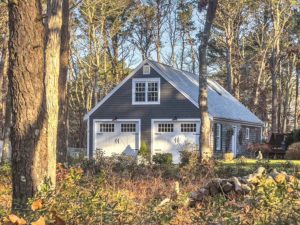WELLFLEET — The tenant in a deed-restricted affordable accessory dwelling unit (ADU) was evicted by his landlord last year, and town officials say they do not know whether the apartment continues to be rented year-round as required. Moreover, there appears to be no regulatory structure in place to enforce the ADU rules.
The current owner of 249 Gross Hill Road is Barry Barton of Framingham, an antiques dealer and proprietor of B. Barton & Company in Hudson. He and his partner, David Ferrini, a real estate agent and luxury property specialist, said that they evicted the tenant, Paul Stepanick, because he was making more money than the income guidelines for the affordable unit allowed. They said the unit is currently rented to a new tenant “who meets all the guidelines.” They declined to name the new tenant.

Wellfleet’s ADU bylaw requires the property owner to submit an annual affidavit of compliance every Sept. 1, confirming that the unit is being leased for a minimum of one year. Town officials including Building Commissioner James Badera and Assessor Nancy Vail told the Independent that no affidavit for that unit had been received by the town.
Stepanick, who now lives in Truro, said Barton and Ferrini’s eviction story is “completely false.” He said the two men told him he had to leave because “they wanted to spend more time out there.”
Stepanick added that the landlords’ story makes no sense because they would have had no way of knowing how much money Stepanick was making. When the unit was first constructed as an affordable dwelling, with funding from a Community Development Block Grant (CDBG) administered by the town of Truro, the income guidelines for tenants were monitored by the Community Development Partnership (CDP).
Up until 2020, said CDP Executive Director Jay Coburn, Truro contracted with the CDP to handle income certification and monitoring. At the end of 2020, however, Truro did not renew the contract with the CDP, Coburn said.
Now, “the towns are responsible for monitoring those grants,” he said.
The deed restriction on 249 Gross Hill Road still names the CDP as the monitoring agent for the property. But Terri Barron, the director of the housing rehabilitation program at the CDP, said, “Unless the town is paying us to do the monitoring, we don’t do it. Nobody is doing it.”
Wellfleet changed its ADU bylaw in 2021 to drop the affordability restriction, and there is simply no framework in place for the town to monitor still-existing affordable ADUs.
“The bylaw changed to just ADUs,” said Building Commissioner Badera. “In terms of affordability requirements, I’m not in charge of it. That oversight is at town hall, supervised by the assistant town administrator.”
But the assistant town administrator, Rebecca Roughley, said that the building commissioner was in charge.
“I don’t think anybody realized that the other one wasn’t doing it,” said Alice Boyd of Bailey Boyd Associates, the CDBG administrator for Truro. Boyd confirmed that, even though the construction loan with which the unit was built had been forgiven, the new owners of the property “still have to comply with the deed restriction,” which runs through the year 2030.
The lack of oversight points to a larger problem in the ADU initiative, said Coburn.
“These kinds of decentralized strategies are really problematic, because they require a level of oversight that there aren’t any resources to pay for,” he said. “This is what happens when the town hasn’t put enough resources into its staffing.”
Wellfleet’s ADU bylaw aims to increase rental housing stock by eliminating the restrictions that were present in the previous affordable ADU bylaw. But so far, there is only one ADU certified for occupancy in town, Badera said, and three more in the process of construction.
Assessor Nancy Vail said there are 180 properties in Wellfleet that are classified as having one or more secondary units that existed before zoning laws were introduced to regulate secondary dwellings.
Desperate for Housing
Barton bought 249 Gross Hill Road from Laurie Miranda, who had created the ADU there over the garage. The 15-year deed restriction required the apartment to be rented out year-round at a fair market rent (FMR) for Barnstable County, which when construction was completed in 2015 was $920 a month. In 2022, the FMR for a one-bedroom unit was $1,428.
Miranda quickly found tenants for the unit. “I was absolutely inundated with people desperate for housing,” she said. Through word of mouth, she found Stepanick and his partner.
“They were wonderful tenants,” Miranda said, “and fantastic people.”
She confirmed that the new owners of the house were well aware of the restriction on the ADU. “It’s written in the deed,” she said.
The main house at 249 Gross Hill Road is listed on Airbnb as a short-term rental. It is described as “a luxurious hotel style stay but in the comfort of a personal home.”
On Dec. 18, the Airbnb listing included this note from the owner: “During your stay on occasion I will be in my separate detached guest quarters — completely private.”
The next day, after a call from a reporter, the note had been changed to read: “During your stay on occasion a tenant in their separate detached/private guest quarters.”
Stepanick believes that no one is currently living in the apartment he had to leave. “I was there two days ago because I had a package mistakenly delivered,” he said. “I haven’t seen any signs of anyone living there.
“It’s important that if housing is available, it’s being used,” he said. “Even if I don’t get to live there, there are so many people in the Outer Cape community that don’t have housing or have less than ideal housing options. People are trying to make a life out here.”



